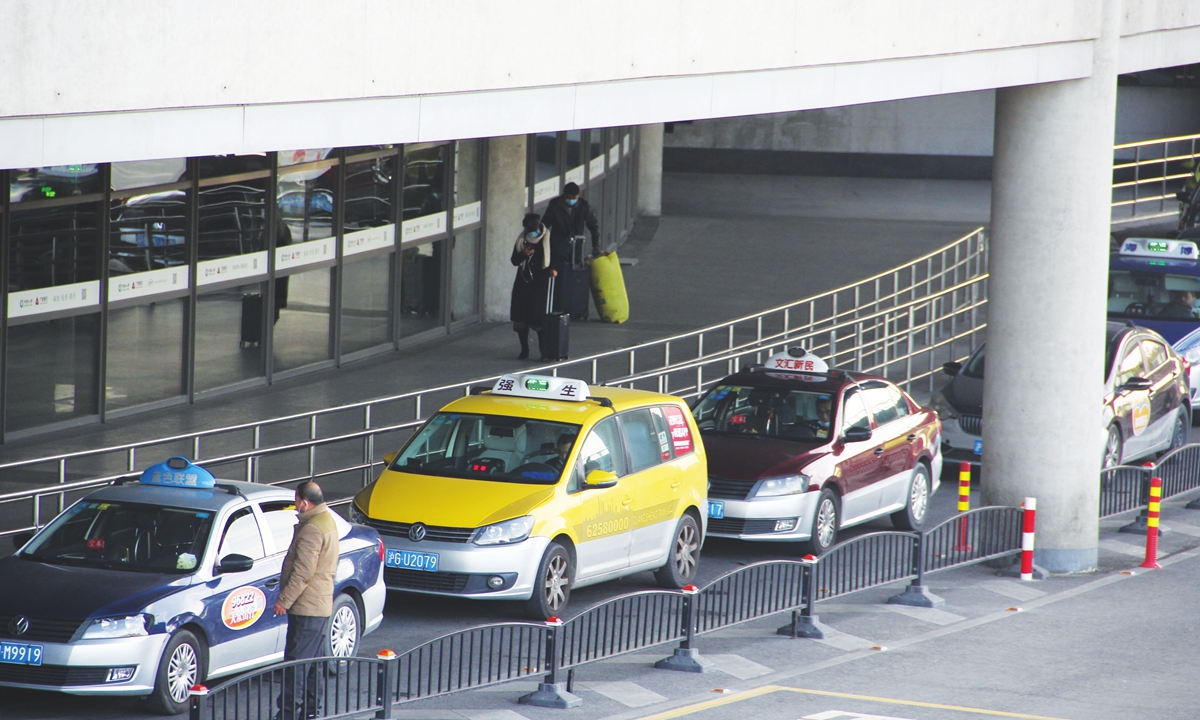Didi’s rivals race to expand user base but tough battle lies ahead
Ride-hailing market in flux

Cars waiting at Shanghai South Station in March Photo: IC
After China's top cyberspace regulator ordered app stores to remove Didi Chuxing over cybersecurity issues, a number of ride-hailing companies are seizing the moment to expand their user base and win market share off the platform giant.
The Cyberspace Administration of China said in July that it has ordered app stores to remove Didi Chuxing, the dominant player in the industry, due to confirmed reports of "serious violations of law and regulation" in the collection and use of personal information. Didi has since been barred from registering new users.
Didi's rivals, which are estimated to be around 200 smaller firms which represent only 10 percent of the market, are seeking out new ways to win turf off the giant, although it's proved to be a tougher battle than originally thought.
A record month
In July, when regulators commenced their probe into Didi, Didi's rivals immediately saw an increase in terms of the orders they handled, according to the statistics of the national online car-hailing supervision information interaction platform.
Geely-backed Cao Cao Mobility handled 32.2 percent more orders in July compared with June, while high-end Shouqi Limousine & Chauffeur recorded a monthly increase of 40.8 percent.
Meituan's ride-hailing service saw an increase of 23.8 percent. Meituan Dache, the ride-hailing app run by China's online food delivery giant Meituan Group that was re-launched on app stores in early July, is viewed as the major threat to Didi.
According to a report by financial news outlet 36kr.com last week, the past two months have been a record-breaking stretch, with Gaode's one-stop mobility aggregation ride-hailing platform recording an increase of one million orders in terms of average daily orders. Cao Cao Mobility saw the figure rose by over 100,000 and Meituan Dache snapped up a 30 percent increase from June.
The report quoted an industry insider as saying the recent period has been "an unexpected bliss" with Didi's smaller rivals seeking out any means to grab more market share available following the vacuum left by the ban on Didi.
An employee from the PR department of Cao Cao Mobility told the Global Times on Sunday that business in July improved as a "normal result" from the traditionally busy part of the year.
"We estimate that by end of August the number of registered users on our platform will exceed 60 million, which makes us the largest services provider among business-to-consumer (B2C) platforms," the employee disclosed, adding the monthly increase is 3 million.
"The competition nowadays does not rely on price alone, like the coarse method companies did a few years ago," added he.
Cao Cao Mobility's B2C model is different from Didi, which relies on the private car owners signing up to its platform.
Data from Didi showed that it had 377 million annual active users and 13 million annual active drivers in China for the 12 months ended March 31.
Liu Dingding, a Beijing-based independent analyst, told the Global Times on Sunday that from his observation, smaller rivals of Didi have seized the unexpected opportunity brought by the regulators' sudden probe on Didi and in many cases had successfully expanded their business presence.
Liu said the car-hailing market will become increasingly fragmented, reflecting consumers' diversified demands.
However, not all challengers made ground.
T3 Chuxing, a Nanjing-based online taxi-booking service launched by three state-owned Chinese carmakers including FAW Group, Dongfeng Motor and Changan Automobile, saw its monthly order actually contract by 7.9 percent in July from June, according to the statistics of the national online car-hailing supervision information interaction platform.
Some analysts said that Didi's platform remain attractive for the time being, because the platform remains the largest and owns more users, ensuring a stable income for drivers and a reliable vehicle availability for users.
The Statistics showed Didi's orders increased by 13.1 percent in July.
Didi's dominance
Didi Chuxing has a nearly 90 percent share of the ride-hailing market in Chinese mainland.
Data from the Transport Ministry revealed, in October 2020, the total number of domestic online ride-hailing orders was 624 million, and Didi's orders reached 562 million, media reports.
A Didi driver based in Beijing told the Global Times that he has not noticed any change in the volume of assignments he received from Didi.
"There was a short period of time, when Didi was put under the probe and platforms were out grabbing drivers and customers... but that only lasted a few weeks," the driver said.
"By the end of July, it appears that Didi is still generating the most orders, as the other platforms don't have the same scale," said the driver.
For the moment, it seems that Didi still enjoys the loyalty of its drivers. A Shanghai-based driver surnamed Wan told the Global Times on Sunday that he believes sticking to one platform - Didi - is still the safest way to play the game.
"I was one of the earliest drivers to download Meituan Dache upon the news of the government's probe into Didi, trying to find an alternative in case Didi is ordered to be shut down completely," Wan said. "However, such a likelihood is really low and Meituan Dache could not offer as many fares as Didi due to its smaller user base."
"I think in the age of big data, it is beneficial to me to display some loyalty to Didi," Wan said.
"Big data knows which driver is loyal and awards the loyal driver with ample and easy fares, which translates into more income," Wang said.


